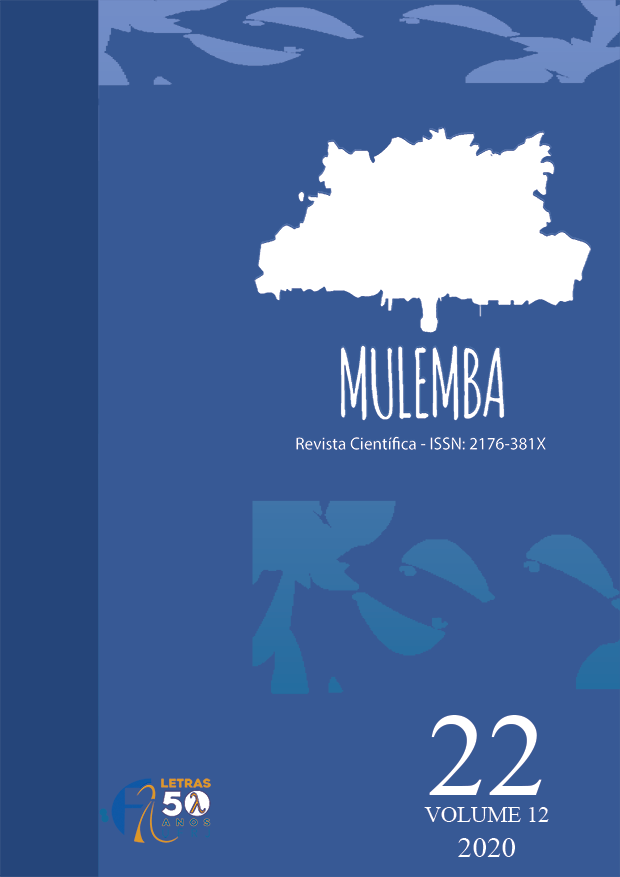Ser mulher e negra nas Áfricas. Combates feministas nas literaturas
DOI:
https://doi.org/10.35520/mulemba.2020.v12n22a39822Keywords:
mulheres negras, literaturas africanas, nacionalismo, feminismosAbstract
A partir de romances de autoria de mulheres africanas de língua portuguesa, inglesa e francesa, interroga-se o significado de ser mulher e negra em diferentes contextos das diásporas e de África, em articulação com as identidades nacionais.
References
ADICHIE, Chimamanda Ngozi. Americanah. London: Fourth Estate, 2013.
BEYALA, Calixthe. Femme nue, Femme noire. Paris: Albin Michel, 2003.
BOEHMER, Elleke. Stories of Women. Gender and Narrative in the Postcolonial Nation. Manchester and New York: Manchester UP, 2005.
BUGUL, Ken. La Folie et la Mort. Paris e Dakar: Présence Africaine, 2000.
CARDOSO, Cláudia. Amefricanizando o feminismo: o pensamento de Lélia Gonzalez.
Estudos Feministas, Florianópolis, 22(3): 320, p. 965-986, setembro-dezembro 2014.
CARNEIRO, Sueli. Movimento Negro no Brasil: Novos e Velhos Desafios. Caderno crh,
Salvador, n. 36, p. 209-215, jan./jun. 2002. Disponível online em: https://www.geledes.org.br/movimento-negro-no-brasil-novos-e-velhos-desafios-por-sueli-carneiro/ Acesso em 12. Out. 2017.
CHIZIANE, Paulina. O Alegre Canto da Perdiz. Lisboa: Caminho, 2008.
El-TAYEB, Fatima. European others. Queering ethnicity in postnational Europe. Minneapolis, University of Minnesota Press, 2011.
EMECHETA, Buchi. The Joys of Motherhood. London: Heinemann, 2008 [1979].
GONZALEZ, Lélia. Racismo e sexismo na cultura brasileira. Revista Ciências Sociais Hoje, Anpocs, p. 223-244, 1984.
KADJIMBO, Luís. Breves reflexões sobre a Geração das Incertezas. A Geração literária angolana do período pós-independência (1980-2001). Textos e Pretextos, Lisboa, nº 19 (Angola. Poesia e Prosa), p. 27-37, 2015.
LUGONES, Maria. Toward a Decolonial Feminism. Hypatia, v. 25, nº 4, p. 742-759, 2010.
MARTINS, Catarina. “La Noire de…” tem nome e tem voz. A narrativa de mulheres africanas anglófonas e francófonas para lá da Mãe África, dos nacionalismos anticoloniais e de outras ocupações, e-cadernos ces [Online], 12 | 2011, Disponível online em: http://eces.revues.org/711 . Consultado a 27 de Fevereiro de 2014.
MARTINS, Catarina. O lugar do “afro”: feminismos negros vs feminismos africanos”. Revista Feminismos, vol. 6, nº 2, p. 4-18, 2018.
MARTINS, Catarina. Desalinhar abismos no reverso do moderno: perspetivas feministas
pós-coloniais para um ‘pensamento alternativo das alternativas’. In: SOUSA SANTOS Boaventura, SENA MARTINS, Bruno (org.). O Pluriverso dos Direitos Humanos: A diversidade das lutas pela dignidade. Belo Horizonte: Autêntica, p. 485-507, 2019.
MCFADDEN, Patricia. Contemporarity: Sufficiency in a Radical African Feminist Life.
Meridians: feminism, race, transnationalism, vol. 17, nº 2, November, p. 415-431, 2018.
MENDONÇA, Fátima. Literaturas Emergentes, Identidades e Cânone. In RIBEIRO, Margarida e MENESES, Paula (org.). Moçambique: das palavras escritas. Porto: Afrontamento, p. 19-33. 2008.
MONTEIRO, Yara. Essa dama bate bué. Lisboa: Guerra e Paz, 2018.
NOA, Francisco. Literatura Moçambicana: os trilhos e as margens. In: RIBEIRO, Margarida e MENESES, Maria Paula (org.). Moçambique: das palavras escritas. Porto: Afrontamento, p. 35-45, 2008.
OWEN, Hilary. Mother Africa, Father Marx. Women’s Writing of Mozambique 1948-2002. Lewisburg: Bucknell University Press, 2007.
OYEWÙMÍ, Oyerónké. Conceptualising Gender: Eurocentric Foundations of Feminist Concepts and the Challenge of African Epistemologies. In: ARNFRED S. et al. (org.). African Gender Scholarship: Concepts, Methodologies and Paradigms. Dakar: Codesria, p. 1-8, 2004.
SELASI, Taiye. Bye Bye Babar. LIP Magazine. 3 March 2005. Disponível em http://thelip.robertsharp.co.uk/?p=76 . Consultado a 5 de Fevereiro de 2020.
SELASI, Taiye. Ghana must go. New York: The Penguin Press, 2013.
SOUSA, Noémia. Sangue Negro. São Paulo: Kapulana, 2016.
STRATTON, Florence. Contemporary African Literature and the Politics of Gender. London and New York: Routledge, 1994.
TAVARES, Paula. Ritos de Passagem. Lisboa: Caminho, 2007.
Downloads
Published
Issue
Section
License
Authors who publish with this journal agree to the following terms:
- Authors retain copyright and grant the journal right of first publication with the work simultaneously licensed under a Creative Commons Attribution License that allows others to share the work with an acknowledgement of the work's authorship and initial publication in this journal.
- Authors are able to enter into separate, additional contractual arrangements for the non-exclusive distribution of the journal's published version of the work (e.g., post it to an institutional repository or publish it in a book), with an acknowledgement of its initial publication in this journal.
- Authors are permitted and encouraged to post their work online (e.g., in institutional repositories or on their website) prior to and during the submission process, as it can lead to productive exchanges, as well as earlier and greater citation of published work (See The Effect of Open Access).

